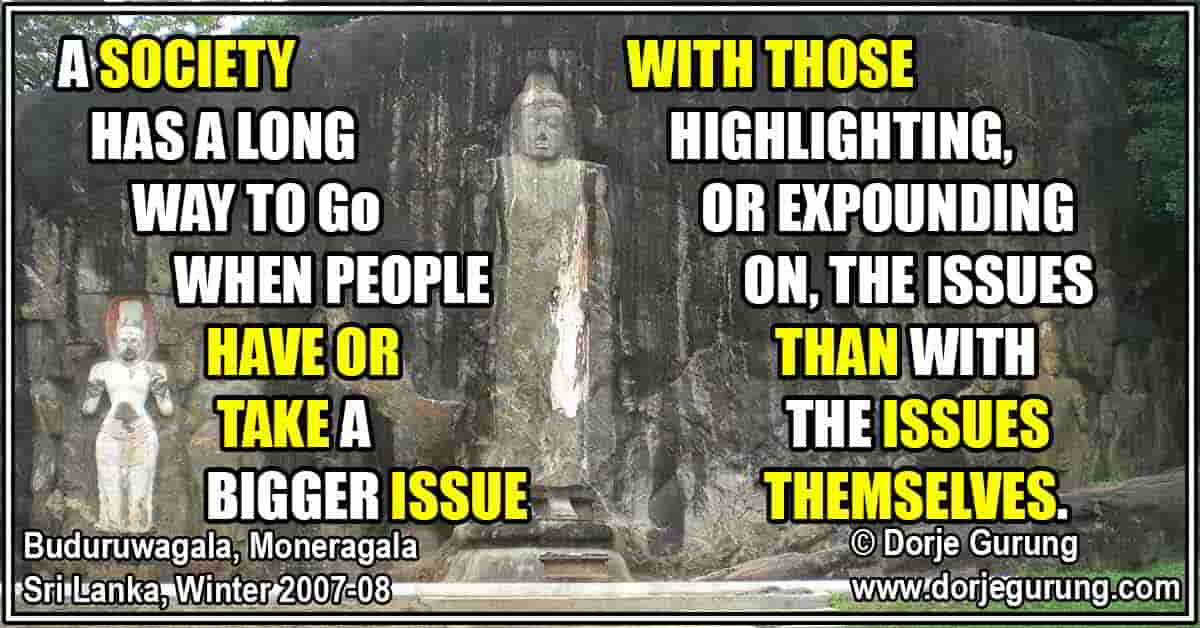A society has a long way to go when people have or take a bigger issue with those highlighting, or expounding on, the issues the society suffers from than with the issues themselves. Having lived in nine other countries and travelled in an additional thirty or so, I can pretty confidently say that that applies to many people and societies around the world.
It definitely applies to Nepali people and society. The conclusion is based on the last seven years of living and working in the country.
In 2013 I returned to Nepal After spending most of the preceding twenty-five years abroad. Pretty much most of the time I have been here, I have been on a campaign to highlight and raise awareness about the myriad of social and structural issues the country suffers from. As a society, we are a long way off from being a just and equitable society, something I am hoping Nepali society will be in the future. So, where possible, I have been doing what I can to contribute directly to change in addition to proposing solutions to the problems. Part of it has also involved engaging in conversations, debates, discussion, discourses etc. with fellow Nepalis both face-to-face and on social media.
I have also observed and listened in to such exchanges. I have also been studying the way fellow Nepalis engage in public discourses at conferences and on television etc.
And that — Nepalis taking issue with people like myself — I have noticed again and again. Most recently and most high profile of those have been our Ministers — yes, MINISTERS — of the country!
And why do they do that? Why do they attack the messenger as it were?
I am sure there are a number of different reasons. Here are the ones I have come up with.
- Abysmally poor quality of education;
- Low level of that poor quality of education of the population (Less than 10% of five and over have twelve or more years of education. Majority therefore struggle to analyze an issue or problem critically, to evaluate and assess others’ opinions and/or data and/or information adequately, and to reason logically. Not all but majority, instead, appeal — and respond — to emotional arguments.);
- High level of religiosity (I don’t think we even have the figures for atheists in the country and likely because of the assumption that everyone is affiliated with one or another religion AND is religious.);
- Patriarchy and male privilege;
- Collective tendency to live in denial of a lot of things, including issues society suffers from (such as mental illness, gender-base violence including domestic violence, caste-based discrimination etc.), and instead prefer to put on a façade (of everyone respecting everyone else and there being “social harmony” between different peoples, for example); partly also because of
- The long list of topics and issues we have a stigma against and/or are considered taboo, and so don’t openly discuss;
- “Khutta tanne prabidhi” (“tendency to pull or the practice of pulling others down”), the very peculiar manner in which Nepalis give vent to jealousy of fellow Nepalis;
- Tendency to look for the easiest option or path (Nepalis generally prefer NOT to challenge themselves intellectually, NOT question themselves etc. and so when conversations on thorny issues come up, they choose one of the two easy options: EITHER go on the offensive and attack the person, OR, go on the defensive. Confronting the thorny issue and engaging in an honest analysis of the issue might call for taking a step or two back, introspecting, taking a hard look in the mirror, evaluating and questioning what they see being reflected back, as it were — all of which would take too much effort, would be too much of…a challenge!); and finally
- Aversion to being — and making others — uncomfortable, whether emotionally, intellectually, or socially; better to attack the solo person raising the issue and silence him/her than make everyone suffer the discomfort of having to engage in an exchange or conversation about the thorny issue.
If, as society, we are to make progress, we have to be willing and able to confront head-on the myriad social issues our society is plagued by. To quote James Baldwin, “Not everything faced can be changed, but nothing can be changed unless it is faced.”
What do you think?

